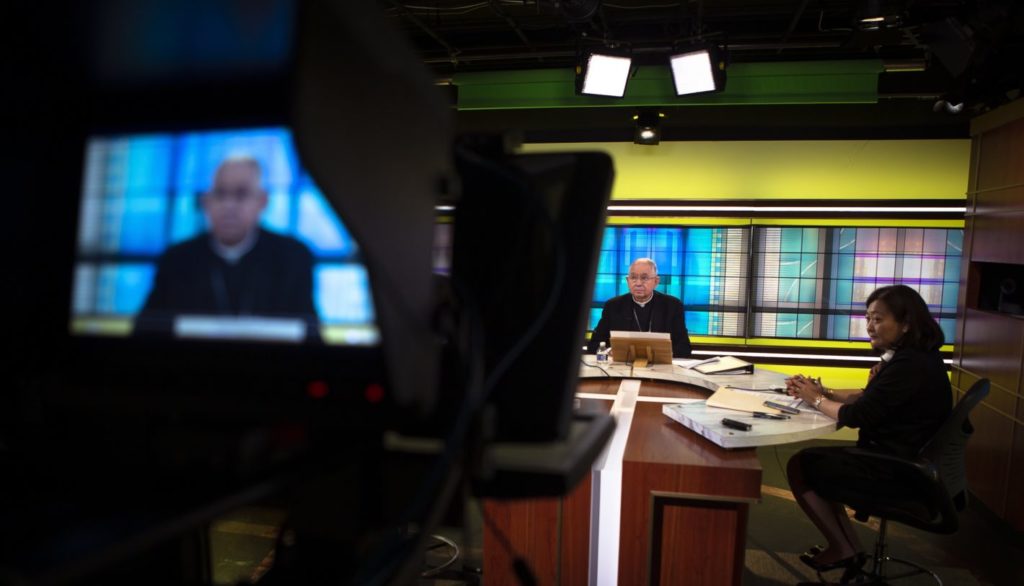Yesterday began the Spring Assembly of the U.S. Conference of Bishops, a meeting that will conclude on Friday and is being held virtually because of the pandemic. Although over the next few days the bishops will address a number of issues relevant to the life of the Church in the United States (new English translations of the Liturgy of the Hours, a pastoral plan for marriage and the family, and a comprehensive vision for Native American ministry), the issue that has dominated from the first minutes in this Assembly, and which reflects the polarization existing in the Church in this country, is the approval of a "statement on the meaning of the Eucharist in the life of the Church."
An initiative addressed to all members of the Church, but which has behind it a main addressee: President Joe Biden, who despite declaring himself a practicing Catholic and a communicant, has promoted since the beginning of his mandate, policies contrary to the teachings of the Church in the defense of life and marriage formed by a man and a woman.
Yesterday, at the beginning of the conference, some bishops opposed to the issuance of the statement tried to modify the agenda of the meeting by proposing to postpone the discussion of the document on the Eucharist until the next Assembly in November and to eliminate the protocol time limits for its discussion, so that the topic could be discussed in person and/or without time limits. The proposal did not succeed, as 59 % of the bishops opposed it. Thus the discussion of the document continues as scheduled for June 17.
This polarization is not only evident in the hierarchy but at all levels of the American Church. That is why in their inaugural addresses, the Apostolic Nuncio to the United States, Archbishop Christophe Pierre, and Archbishop Jose H. Gomez, Archbishop of Los Angeles and President of the Conference of Bishops, launched a fervent call for unity and not to associate faith or marry it to ideologies or political parties. As we emerge from this pandemic we must ask ourselves if "are we being a Church that responds to the real needs of our people?" said Bishop Christophe Pierre. The model of the Church that Christ calls us to be, he said, is the model of the Good Samaritan, "who goes out with compassion and mercy to those who suffer to bring them true healing."
What is lacking today in the process of evangelization, he said, is "to begin again from Jesus Christ," but the starting point is not to shame the weak, but to propose the One who can strengthen us in our weaknesses through the sacraments of reconciliation and the Eucharist. "Holy Communion," the nuncio indicated, "is not simply a thing to be received, but is Christ Himself: a Person to be encountered. A Catholicism that is confused with a mere cultural tradition or that does not distinguish itself from other proposals, even political or ideological ones, based on certain values, will never convince this generation or the new ones. We are not a church of the perfect, but a pilgrim Church in need of the mercy offered by Christ". It is not a matter of crushing others, but of accompanying, loving and dialoguing respectfully, the Nuncio clarified.
Jose Gomez, acknowledged that the (political) division in American society also reflects and affects the Church: "We live in a secular society where politics becomes a substitute for religion for many people. Therefore, "we need to guard against the temptation to think of the Church only in political terms. Unity in the Church does not mean conformity of opinion, or that the bishops never disagree. The apostles argued passionately. They disagreed about pastoral strategies and methods. But they never disagreed about the truth of the gospel. In the wake of the pandemic, Gomez said, our Holy Father calls us to strengthen the unity of the Body of Christ.
The unity urged by Archbishops Pierre and Gomez will be put to the test today in what will be a heated debate among the bishops over the wording and terminology of this statement on the Eucharist in the life of the Church.









